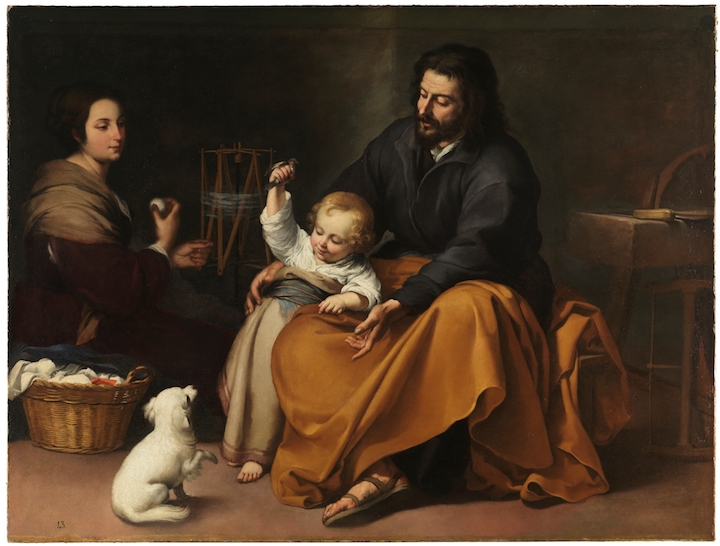Home. It is a magical word that resonates with all of us. Even those from broken homes, or homes that no longer exist, there is still something in the idea that is sought after. Home is that place where we are meant to be safe, nurtured, known for who we are, to freely live and love.
Home’s universal appeal populates culture. Take Me Home, Country Road, Sweet Home Alabama, and I’ll Be Home for Christmas are a few songs that invoke the theme. Movies and literature end happily with protagonists, like Odysseus, finally going home. The entire goal of the American pass-time of baseball is to be safe at home. YouTube videos of joyful homecomings fill up our social media feeds and we spend billions of dollars constructing and decorating our own houses, turning them into Home Sweet Home.
Our homes are the great theatre where the drama of our lives unfolds, as G.K. Chesterton eloquently said:
The place where babies are born, where men die, where the drama of mortal life is acted, is not an office or a shop or a bureau. It is something much smaller in size and much larger in scope. And while nobody would be such a fool as to pretend that it is the only place where people should work, or even the only place where women should work, it has a character of unity and universality that is not found in any of the fragmentary experiences of the division of labour.
Home, by its nature, foreshadows heaven. Pope Saint John Paul II’s final words in this life were “Let me go to the house of the Father.” He wanted to go home – to the home that all of us are willed by God to go to, even if he allows our own will to lead us somewhere else.
Ironically, despite the innate human desire that there is for home, the notion that someone would actually want to make a home, providing a place of safety, love, cleanliness, order, education, and care, has fallen out of favor. Could there be, in the minds of millions of women today, anything worse than being a “homemaker”?
In the 1960s, women left home. In The Feminine Mystique, Betty Friedan articulated an idea that resonated with millions of Western women: “the ache that has no name.” When Friedan and her feminist friends asked, “Is this all there is?” they assumed the answer was “yes.” In their female frenzy to escape home, the elite narrative became that women should offer a collective non serviam, a resounding “no” to serving their families, their children, or any future but their own.
Wendell Berry captured some of the illogic of liberated women when he asked: “Why would any woman who would refuse, properly, to take the marital vow of obedience (on the ground, presumably, that subservience to a mere human being is beneath human dignity) then regard as ‘liberating’ a job that puts her under the authority of a boss (man or woman) whose authority specifically requires and expects obedience?”

Women following the downward stream of the culture haven’t yet realized that the general malaise or malcontent felt by 1960s housewives is the same emptiness they feel now. Feminism hasn’t led women to happiness, just to more searching, grasping, transitioning, with the next best thing around the corner. What they don’t know is that no career, string of lovers, exotic trips to Bali, or Louis Vuitton handbags will fill this gap.
In the meantime, children became the enemy, preventing women from fulfilling their dreams. Abortion became a necessity. The number of children lost through abortion is staggering. As the Vietnam War came to an end, casualties of that war – 58,220 U.S. servicemen total – were dwarfed by this new kind of killing, mothers killing their own children (60 million and counting, 3000 daily). Abortion is by far the number one cause of death in the United States annually, outpacing heart disease and cancer.
What happens, then, when you have generations of people that have willfully killed their own children through abortion? The Medievals were against abortion because it takes an innocent life, but also because they knew it was mortally damaging to the human soul. It isn’t just a child that dies in an abortion, but something in the mother and the father dies as well.
As St. Thomas Aquinas said, bonum est diffusivum sui, the good spreads itself out. The opposite is also true: evil spreads itself out. This grave evil has reached into every area of familial life.
It is any wonder, then, that our spiritual home, the Church, seems to be crumbling from the core? When the fundamental piece of society — the family — has been shredded, it shouldn’t surprise us to see similar fallout in the Church. We expect bishops to know better, and to be holy and good, but they too are a product of our torn-asunder culture.
This doesn’t absolve them of their crimes, but at least helps us to understand how those entrusted with the care of so many souls could respond with gross malfeasance. When some women can view the destruction of their children as a social rite of passage to join the “sisterhood,” it isn’t too far of a leap to see that bishops could abandon their spiritual children to join the “brotherhood.”
“There are two ways of getting home,” Chesterton explained, “One of them is to stay there. The other is to walk round the whole world till we come back to the same place.”
We are a culture that needs to reclaim the home, having looked the world over for happiness. Radical feminists, although they have looked high and low, still have “that ache that cannot be defined.” Their restless hearts are a God ache, which will remain until they make their way back Home again.
*Image: The Holy Family with a Bird by Bartolomé Esteban Murillo, 1650 [Museo del Prado, Madrid]














